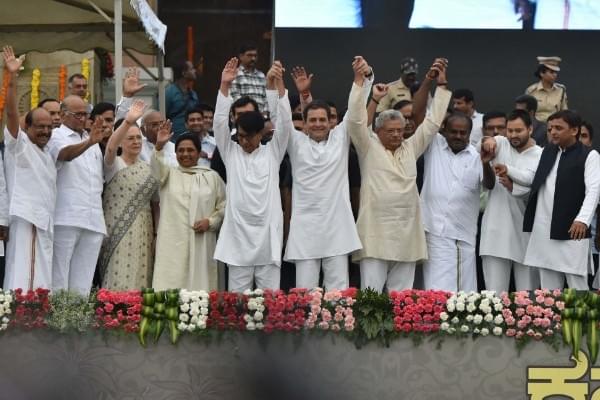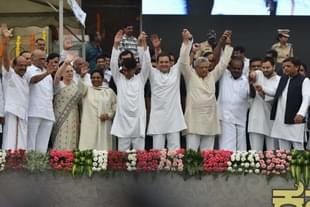Politics
Looking Past The Hug-And-Wink Theatrics – The Discrediting Of The Stillborn Mahagathbandhan
Aashish Chandorkar
Jul 21, 2018, 05:24 PM | Updated 05:24 PM IST
Save & read from anywhere!
Bookmark stories for easy access on any device or the Swarajya app.


On 20 July, the Narendra Modi government faced its first ‘no-confidence motion’ just as it began its fifth year in office. The motion was the twenty-seventh such instance of an opposition expressing lack of confidence in the ruling government and the first one since 2003. Prime minister Atal Behari Vajpayee had easily sailed through his floor test last time around, and the same outcome awaited the opposition on Friday.
The motion moved by the Telugu Desam Party (TDP), former Bharatiya Janata Party (BJP) ally and participant in the central government, was vociferously backed by the Rahul Gandhi-led Congress. It was defeated 325 votes to 126 on the floor of the Lok Sabha. But during the debate, the Congress president hugged Prime Minister Modi in an apparent gesture of love and respect towards his political opponent.
The newspaper headlines in the morning were predictable. Gandhi had come of age and won hearts. He had proven his mettle finally. Though it gave away his sense of theatrical triumph of executing a ploy as scripted, his wink after the hug has been explained as playful reflection of India’s youthful sensibilities. In the rush to certify Gandhi’s latest brush with political maturity, the commentary on the no-confidence motion missed three points on a single theme – the alliance math for the 2019 Lok Sabha election.
First, this motion was touted as the show of Mahagathbandhan (the grand alliance) strength against the Modi government. Sonia Gandhi confidently claimed Congress had the numbers even as the notice for the motion was accepted by Lok Sabha Speaker Sumitra Mahajan without any fuss.
The Congress-led opposition mustered 126 votes in its favour. Several parties are decidedly anti-Modi and anti-Bharatiya Janata Party. The minimum number of votes the opposition should have had was 144 (see table). Instead, only 126 votes were polled.
What explains the difference of 18 votes? We know a few things. Kamal Nath, the senior-most Congress Member of Parliament (MP) stayed back in his election-bound state of Madhya Pradesh on the pretext of attending a panchyat sammelan. He went on record openly mocking the no-confidence motion, saying his 38 years of experience was enough to tell him it was a waste of time. Some media reports said that the Kairana MP from Rashtriya Lok Dal, Tabassum Hasan, voted erroneously in favour of the government. Couple of Trinamool Congress MPs stayed back to arrange an impending rally in West Bengal.
Even accounting for all these explanations, it appears that a good number – possibly even double digits – voted against the Mahagathbandhan and supported the Modi government. Gandhi failed to keep his own flock together. He could not get his entire set to even travel to Delhi for his coming of age, forget voting for his cause.
Admittedly, two pillars of the Mahagathbandhan – the Bahujan Samaj Party and the Dravida Munetra Kazhagam have no Lok Sabha members. Nonetheless, avowedly anti-Modi MPs voting for the Prime Minister, defying party whips, risking disqualification from Lok Sabha, is a big show of no confidence – in Gandhi’s leadership.
Second, the story reversed on the Bharatiya Janata Party side. The government managed 325 votes. The National Democratic Alliance (NDA) strength was reduced with Shiv Sena abstaining. But the government could have got 325 votes only with a bunch of All India Dravida Munetra Kazhagam (AIADMK) and several small regional parties mainly from the North East voting for it. Additionally, the Biju Janata Dal (BJD) did not even attend the proceedings and moved out of the House even before the motion was moved.
In a big surprise for future alliances, Prime Minister Modi profusely praised Telangana Rashtra Samiti (TRS) in his speech and its members walked out before the vote division.
The leaders of AIADMK, BJD, and TRS have been routinely critical of the Modi government. However, they chose not to stand with the Congress and Gandhi, and some even voted for the government. This is a big win for the BJP just as the media was beginning to spin the narrative of a 2019 Mahagathbandhan win being a fait accompli.
Third, the Prime Minister made an aggressive speech. While a lot has been written about his use of data and rhetoric, one point not highlighted in the media was his exhortation of potential Congress partners to recall their insults at the hand of the very same party. Modi named several leaders like former president Pranab Mukherjee, Sharad Pawar, and former prime minister H D Devegowda, who were insulted by the Congress or were discarded after meeting the political ends.
This line of reasoning is interesting. The Prime Minister did not criticise Pawar or Devegowda, two potential pillars of the Mahagathbandhan. Instead, he reminded their supporters about how the Congress had insulted their tall leaders. Regional leaders depend on regional pride for whipping identity pride, their electoral mainstay. By telling their voters that their tall leaders were allying with a party that had previously insulted them, and, by corollary, their regional pride, Modi attempted to open a trust deficit between the voters and the leaders as well as the leaders and the Congress.
This may well be the line of attack the BJP will use through the 2019 Lok Sabha campaign. It will attempt to impose a cost on regional satraps allying with Congress and, in the bargain, try and seamlessly transition regional pride-driven voters into a national-pride cause. Whether and how much the BJP succeeds remains to be seen, but it is an interesting and attacking move right at the onset of the 2019 campaign.
It is clear that the BJP will continue to corner Gandhi as a leader unfit to run a national government. It will also drive a wedge in the Mahagathbandhan by appealing to the regional parties’ ego, telling them they cannot be accepting Gandhi as their leader. Without a leader known nationally, the much-touted Mahagathbandhan remains stillborn.
The newspapers chose to run streamers lauding Gandhi for his speech and mocking Modi for not handling the Gandhi hug well. The key takeaway of the proceedings, however, was a further delay in cementing a national Mahagathbandhan, along with the NDA keeping doors open for old and new partners.
Madhya Pradesh Chief Minister Shivraj Singh Chouhan explained this nicely in a tweet – the Congress remained focused on stagecraft, missing the nuances of statecraft. Unfortunately, the media followed.
Aashish Chandorkar is Counsellor at the Permanent Mission of India to the World Trade Organization in Geneva. He took up this role in September 2021. He writes on public policy in his personal capacity.





